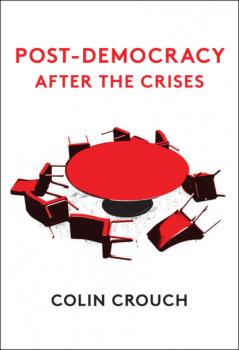Зарубежная публицистика
Различные книги в жанре Зарубежная публицистикаChina Goes Green
What does it mean for the future of the planet when one of the world’s most durable authoritarian governance systems pursues “ecological civilization”? Despite its staggering pollution and colossal appetite for resources, China exemplifies a model of state-led environmentalism which concentrates decisive political, economic, and epistemic power under centralized leadership. On the face of it, China seems to embody hope for a radical new approach to environmental governance. <br /><br />In this thought-provoking book, Yifei Li and Judith Shapiro probe the concrete mechanisms of China’s coercive environmentalism to show how ‘going green’ helps the state to further other agendas such as citizen surveillance and geopolitical influence. Through top-down initiatives, regulations, and campaigns to mitigate pollution and environmental degradation, the Chinese authorities also promote control over the behavior of individuals and enterprises, pacification of borderlands, and expansion of Chinese power and influence along the Belt and Road and even into the global commons. Given the limited time that remains to mitigate climate change and protect millions of species from extinction, we need to consider whether a green authoritarianism can show us the way. This book explores both its promises and risks.
Political Science For Dummies
Expand your political science knowledge with a book that explains concepts in a way anyone can understand! The global political climate is dynamic, at times even volatile. To understand this evolving landscape, it’s important to learn more about how countries are governed. Political Science For Dummies explores the questions that political scientists examine, such as how our leaders make decisions, who shapes political policy, and why countries go to war. The book is the perfect course supplement for students taking college-level, introductory political science courses. Political Science For Dummies is a guide that makes political science concepts easier to grasp. Get a better understanding of political ideologies, institutions, policies, processes, and behavior Explore topics such as class, government, diplomacy, law, strategy, and war Learn the specialized vocabulary within the field of political science Help prepare for a range of careers, from policy analyst to legislative assistant Political science crosses into many other areas of study, such as sociology, economics, history, anthropology, international relations, law, statistics, and public policy. Those who want to understand the implications of changing political economies or how governing bodies work can look to Political Science For Dummies. It’s the book thatcuts through the jargon as it focuses on issues that interest readers.
Post-Democracy After the Crises
In <i>Post-Democracy</i> (Polity, 2004) Colin Crouch argued that behind the façade of strong institutions, democracy in many advanced societies was being hollowed out, its big events becoming empty rituals as power passed increasingly to circles of wealthy business elites and an ever-more isolated political class.<br /><br />Crouch’s provocative argument has in many ways been vindicated by recent events, but these have also highlighted some weaknesses of the original thesis and shown that the situation today is even worse. The global financial deregulation that was the jewel in the crown of wealthy elite lobbying brought us the financial crisis and helped stimulate xenophobic movements which no longer accept the priority of institutions that safeguard democracy, like the rule of law. The rise of social media has enabled a handful of very rich individuals and institutions to target vast numbers of messages at citizens, giving a false impression of debate that is really stage-managed from a small number of concealed sources. Crouch evaluates the implications of these and other developments for his original thesis, arguing that while much of his thesis remains sound, he had under-estimated the value of institutions which are vital to the support of a democratic order. He also confronts the challenge of populists who seem to echo the complaints of Post-Democracy but whose pessimistic nostalgia brings an anti-democratic brew of hatred, exclusion and violence.
The Left Case for Brexit
Liberal left orthodoxy holds that Brexit is a disastrous coup, orchestrated by the hard right and fuelled by xenophobia, which will break up the Union and turn what’s left of Britain into a neoliberal dystopia. <br /> <br /> Richard Tuck’s ongoing commentary on the Brexit crisis demolishes this narrative. He argues that by opposing Brexit and throwing its lot in with a liberal constitutional order tailor-made for the interests of global capitalists, the Left has made a major error. It has tied itself into a framework designed to frustrate its own radical policies. Brexit therefore actually represents a golden opportunity for socialists to implement the kind of economic agenda they have long since advocated. Sadly, however, many of them have lost faith in the kind of popular revolution that the majoritarian British constitution is peculiarly well-placed to deliver and have succumbed instead to defeatism and the cultural politics of virtue-signalling. Another approach is, however, still possible.<br /> <br /> Combining brilliant contemporary political insights with a profound grasp of the ironies of modern history, this book is essential for anyone who wants a clear-sighted assessment of the momentous underlying issues brought to the surface by Brexit.
Remaking One Nation
In these divided and divisive times, what is the future course for our politics? In this ground-breaking book, Nick Timothy, one of Britain’s leading conservative thinkers and commentators, explores the powerful forces driving great changes in our economy, society and democracy. Drawing on his experience at the top of government, Timothy traces the crisis of Western democracy back to both the mistaken assumptions of philosophical liberalism and the rise of ideological ultra-liberalism on left, right and centre. Sparing no sacred cows, he proposes a new kind of conservatism that respects personal freedom but also demands solidarity. He argues that only by rediscovering a unifying sense of the common good and restoring a mutual web of responsibilities between all citizens and institutions can we reject the extremes of economic and cultural liberalism, overcome our divisions, and remake one nation. He goes on to outline an ambitious practical plan for change, covering issues ranging from immigration to the regulation of Big Tech. Nick Timothy’s original, forensic and thought-provoking analysis is a must-read for anybody tired by the old dogmas of the liberal left, right and centre. It is a major contribution to the debate on the future of conservatism as it grapples with geopolitical shifts, cultural change, and economic uncertainty.
Conspiracy Theories
9/11 was an inside job. The Holocaust is a myth promoted to serve Jewish interests. The shootings at Sandy Hook Elementary School were a false flag operation. Climate change is a hoax perpetrated by the Chinese government. These are all conspiracy theories. A glance online or at bestseller lists reveals how popular some of them are. Even if there is plenty of evidence to disprove them, people persist in propagating them. Why? Philosopher Quassim Cassam explains how conspiracy theories are different from ordinary theories about conspiracies. He argues that conspiracy theories are forms of propaganda and their function is to promote a political agenda. Although conspiracy theories are sometimes defended on the grounds that they uncover evidence of bad behaviour by political leaders, they do much more harm than good, with some resulting in the deaths of large numbers of people. There can be no clearer indication that something has gone wrong with our intellectual and political culture than the fact that conspiracy theories have become mainstream. When they are dangerous, we cannot afford to ignore them. At the same time, refuting them by rational argument is difficult because conspiracy theorists discount or reject evidence that disproves their theories. As conspiracy theories are so often smokescreens for political ends, we need to come up with political as well as intellectual responses if we are to have any hope of defeating them.
Открытый Заговор
Работа «Открытый Заговор» принадлежит перу известного английского писателя Герберта Уэллса, широко известного в России в качестве автора научно-фантастических романов «Машина времени», «Человек-невидимка», «Война миров» и другие. Помимо этого, Уэллс работал в жанрах бытового романа, детской, научно-популярной литературы и публицистики. «Открытый Заговор» – редкий для английского писателя жанр, который можно назвать политическим. Предлагаемую работу можно даже назвать манифестом, содержащим призыв к человечеству переустроить мир на новых началах. «Открытый Заговор» ранее не переводился на русский язык и в нашей стране не издавался. Первая версия этой работы увидела свет в 1928 году. Несколько раз произведение перерабатывалось и переиздавалось. Настоящая книга является переводом с издания 1933 года. Суть предлагаемого Уэллсом переустройства мира – в демонтаже суверенных государств и создании вместо них Мирового государства, возглавляемого Мировым правительством. Некоторые позиции программы «Открытого Заговора» выглядят утопичными, но, вместе с тем, целый ряд положений программы уже воплощен в жизнь, а какие-то находятся в стадии реализации. Несмотря на то что работа писалась около 90 лет назад, она помогает лучше понять суть процессов, происходящих сегодня в мире.
Der Bundesrat
Das neue Nachschlagewerk zum Bundesrat ist die erste politikwissenschaftliche Analyse der Schweizer Regierung. Sie beleuchtet die Besonderheiten der Schweizer Exekutive und Politik aus sozialwissenschaftlicher Perspektive.
Was braucht es, um Bundesrat zu werden? Welche Persönlichkeitseigenschaften zeichnen unsere Regierungsmitglieder aus? Wie weit erfüllt der Bundesrat seine Regierungsaufgaben? Welche Regierungsreform schneidet am besten ab? Die siebenköpfige Kollegialregierung der Schweiz ist ein Unikum im internationalen Vergleich und wurde bis heute kaum untersucht. Der Politikwissenschaftler Adrian Vatter analysiert in seinem Buch die Rolle und den Einfluss des Bundesrats im Schweizer Politiksystem und seine politische Zusammensetzung im Verlauf der Zeit. Er untersucht die gesellschaftliche Herkunft und die Persönlichkeitsprofile der Bundesräte, beschäftigt sich mit der Organisation des Bundesrats und der Ausübung seiner Regierungsaufgaben und prüft die zahlreichen Modelle zur Regierungsreform auf ihre Wirkungen. Mit der politikwissenschaftlichen Darstellung und Analyse des Bundesrats beleuchtet Vatter erstmals in dieser Breite und Tiefe die Funktionsweise der Schweizer Regierung.
Katastrophen, Krisen und kluge Köpfe
Die Buchidee, eine fiktive Weltgeschichte, entstand aus einem Gefühl der Ohnmacht angesichts der misslichen Lage der Menschheit auf ihrem malträtierten Planeten. Wie, wenn die Geschichte anders verlaufen wäre? Wenn die Erde Homo sapiens Schranken gesetzt hätte? Wenn er von seiner Weisheit mehr Gebrauch gemacht hätte? In dieser fiktiven Weltchronik dringt der Mensch von Ostafrika her nie weiter vor als bis nach Europa und Westasien. Zudem leben zu keiner Zeit mehr als 30 Millionen Individuen auf dem Globus. Derzeit bewohnen sie einzig die Länder zwischen der Ostsee und dem Mittelmeer, dazu einige Gebiete in Afrika und Asien. Ihr Lebensstil ist dem unsrigen aber sehr ähnlich. Die erdachte Menschheitsgeschichte lehnt sich eng an unsere eigene Historie an. Allerdings wird deren Schärfe gemildert, und die Völker erlangen schließlich – anders als in der Realität – ein Gleichgewicht untereinander und mit der Natur. Das Buch schildert seriös, empathisch oder satirisch alle wesentlichen Geschichtsepochen der fiktiven Erde. Zwar fehlen dort viele uns vertraute Nationen, aber dafür erfreuen sich die Menschen eines heilen Planeten und zählen Wesen zu ihren Mitbewohnern, die bei uns längst ausgerottet sind: Riesenalken, Riesenmoas, Riesenfaultiere!









